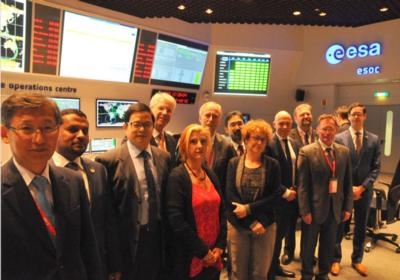Senior Managers From 14 Agencies Meet At ESA HQ In Germany
Senior managers representing 14 space agencies participating in the International Space Exploration Coordination Group (ISECG) affirmed their commitment to fostering broad international cooperation to further advance the exploration and utilization of space.

The senior managers met at the European Space Agency (ESA) European Space Operations Center in Darmstadt, Germany on Oct. 7 to discuss potential common next steps for the implementation of the Global Exploration Roadmap.
The senior managers reiterated their support of the roadmap’s step-wise approach to the expansion of human presence into the solar system with human missions to the surface of Mars as the overarching long-term goal. They recognized the value of human missions to cislunar space to prepare for missions farther into space. They also discussed innovative opportunities created by the presence of humans and their infrastructure in cislunar space for implementation of robotic and human lunar surface missions.
The senior managers agreed that the International Space Station (ISS) is a critical platform for understanding the effects of long-term microgravity exposure on the human body and advancing systems and technology readiness for future missions. They acknowledged the efforts by several agencies to foster private sector engagement for the provision and utilization of capabilities in low-Earth orbit (LEO). They agreed to further elaborate a vision for the future of human activity in LEO, including maximizing the use of the ISS as an orbiting laboratory during its lifetime while noting the need for research platforms in LEO for governmental and non-governmental use after the ISS.
The space agency managers welcomed the development of a white paper on science opportunities enabled by human exploration, which is being prepared by ISECG participant space agencies with the broader science community. They recognized the importance and willingness of engagement by the science community to inform exploration scenario developments and to illustrate how human exploration leads to new and outstanding scientific knowledge as well as other societal benefits.
They also discussed the importance of advancing knowledge and technologies for the use of local resources on the Moon and Mars for the sake of the exploration missions. This is of great interest to several space agencies, which are, in coordination with the international science community and private entities, assessing sustainable exploration approaches utilising in-situ resources (in particular lunar volatiles). Space agencies are advancing continued collaboration with government and non-government entities in this area that will be documented in a public website.
The meeting included representatives from the Italian Space Agency, the French Centre National d’Etudes Spatiales, China National Space Administration, Canadian Space Agency, German Aerospace Center, ESA, Indian Space Research Organisation, Japan Aerospace Exploration Agency, Korea Aerospace Research Institute, National Aeronautics and Space Administration, State Space Agency of Ukraine, Russian Federal Space Agency, the U.K. Space Agency and the United Arab Emirates Space Agency.
(Source: NASA. Image provided by NASA. [L-R] In Hee Hwang, KARI Executive Director of Convergence Technology Research Head Office; Khaled Al Hashmi, UAE Space Agency Director of Space Missions; Cheng Wang, Division Director, CNSA Department of System Engineering; Thomas Reiter, ESA Director of Human Spaceflight and Operations; Delfina Bertolotto, ASI Head of Human Spaceflight; William Gerstenmaier, NASA Associate Administrator, Human Exploration and Operations; Yasuyuki Ito, JAXA Associate Director General; Fabienne Casoli, CNES Deputy Director for Strategy and Programmes; Rolf Densing, DLR Program Director; Gilles Leclerc, CSA Director General Space Exploration; Oleg Gorshkov, Acting Director General TSNIImash; Andrew Kuh, UKSA Human Spaceflight and Microgravity Programme Manager. Not pictured: Indian Space Research Organisation and the State Space Agency of Ukraine.)
 ANN's Daily Aero-Term (05.07.25): Terminal Radar Service Area
ANN's Daily Aero-Term (05.07.25): Terminal Radar Service Area ANN's Daily Aero-Linx (05.07.25)
ANN's Daily Aero-Linx (05.07.25) Classic Aero-TV: Anousheh Ansari -- The Woman Behind The Prize
Classic Aero-TV: Anousheh Ansari -- The Woman Behind The Prize NTSB Prelim: Bell 206B
NTSB Prelim: Bell 206B Airborne-NextGen 05.06.25: AF Uncrewed Fighters, Drones v Planes, Joby Crew Test
Airborne-NextGen 05.06.25: AF Uncrewed Fighters, Drones v Planes, Joby Crew Test



